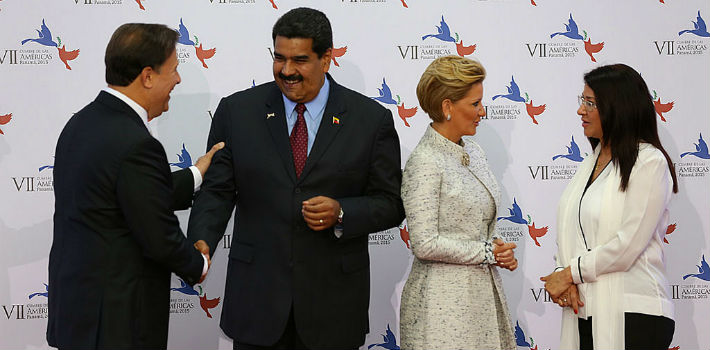Sabrina Martin writes in the PanAm Post about the 1 billion dollar debt owed to Panama by Venezuela.
Panama and Venezuela are set to open a second meeting between the two country’s leaders within a month, but the discussions are unlikely to be all smiles. Panamanian authorities are determined to claw back the US$1 billion debt Venezuelans owe firms operating in Panama’s Colón Free Trade Zone (CFZ).
Panamanian Trade and Industry Minister Melitón Arrocha told press on Monday that ongoing dialogue between the two countries is touching on the possibility of honoring the debt — which means pressure on Chavista officials to come up with US dollars for bolívares in the controlled exchange market. Venezuela’s payment of exporters in Panama broke down over two years ago amid mutual allegations of fraud and corruption.
Arrocha explained that four working groups and an initial bilateral meeting have already tackled the issue, and that Panamanian experts have begun to make revisions to the terms of the debt following the failure of Venezuelan firms, allegedly in cahoots with the government, to pay back what they owe the free-trade port.
“The objective of the government of Panama is to continue representing the owners of the CFZ, who are very enthusiastic about the idea of converting the bolívar into the dollar,” he added.
On April 23, Panamanian Vice Foreign Minister Luis Miguel Hincapié also met with representatives of the Venezuelan government in Caracas to “strengthen commercial, energy, and social agreements between both countries.”
On the same day it became known that almost half of the debt that Venezuelans owe Panama is with the Central American nation’s Copa Airlines, with the remainder owed to the companies that manage the CFZ, the hemisphere’s principal free-trade port.
In 2014, both countries signed various mechanisms to pay the remaining balance owed by Venezuelan firms to their Panamanian counterparts, but continued failure in that regard has hampered commercial relations. Venezuela and Colombia are the two principal destinations in South America for the re-exportation of products from the CFZ, but both have reduced their imports from Panama throughout 2013 and 2014.
Two Years on Ice
Business owners in the isthmus have had to wait two years and a change of government to begin to recover the $1 billion owed them.
In early 2014, during the final stages of the administration of former President Ricardo Martinelli, controversy between Panama and Venezuela over collection of the debt first broke out. Martinelli was pressured by local business leaders to prioritize the issue as a matter of national importance.
However, the response of Maduro in Venezuela was quick to arrive: “We don’t owe a cent to anyone.” The Venezuelan Foreign Ministry, then headed by Elías Jaua, subsequently claimed that “90 percent” of the debt claimed by Martinelli was “fraudulent.” Jaua threatened to bring criminal charges against the Panamanian government, arguing that the Maduro administration had paid Panamanian businesses for imported goods that never arrived in Venezuela.
Corruption Tit for Tat
By contrast, in March 2014, CFZ General Manager Leopoldo Benedetti claimed that the “fraud” in relation to the Venezuela-Panama debt had been committed by Caracas itself.
Benedetti claimed that Venezuelan businesses were behind the fraud, in collaboration with the Venezuelan Central Bank (BCV), state foreign currency distributor Cadivi, and the National Tax and Customs Service.
“The debts of Cadivi add up to $1.472 billion, and we discovered that of this debt $937 million has nothing to do with the Free Zone, but with fraud committed in Venezuela,” Benedetti said, alleging that Venezuelan businessmen were using “ghost companies” to run up debts without paying for them.
According to the FTZ director, Venezuelan business magnates had presented receipts to the BCV and Cadivi in order to secure dollars, which allowed them to make purchases via false companies registered in the Panamanian zone.
“But this cash never reached any company in the free zone, nor did it arrive to Panamanian companies, it went to one of their banks where they move their money,” he argued.
Also in March of 2014, Maduro alleged that Martinelli had asked for a 20 percent commission from Panamanian firms for each payment received from Cadivi, to finance his electoral campaign. Negotiations were subsequently suspended and diplomatic ties severed up until President Juan Carlos Varela came to power.
In October 2014, Arrocha visited Venezuela to negotiate the payment of the debts, but he only managed to secure the reestablishment of bilateral commissions to discuss the issue.
Benedetti claimed that Venezuelan businesses were behind the fraud, in collaboration with the Venezuelan Central Bank (BCV), state foreign currency distributor Cadivi, and the National Tax and Customs Service.
“The debts of Cadivi add up to $1.472 billion, and we discovered that of this debt $937 million has nothing to do with the Free Zone, but with fraud committed in Venezuela,” Benedetti said, alleging that Venezuelan businessmen were using “ghost companies” to run up debts without paying for them.
According to the FTZ director, Venezuelan business magnates had presented receipts to the BCV and Cadivi in order to secure dollars, which allowed them to make purchases via false companies registered in the Panamanian zone.
“But this cash never reached any company in the free zone, nor did it arrive to Panamanian companies, it went to one of their banks where they move their money,” he argued.
Also in March of 2014, Maduro alleged that Martinelli had asked for a 20 percent commission from Panamanian firms for each payment received from Cadivi, to finance his electoral campaign. Negotiations were subsequently suspended and diplomatic ties severed up until President Juan Carlos Varela came to power.
In October 2014, Arrocha visited Venezuela to negotiate the payment of the debts, but he only managed to secure the reestablishment of bilateral commissions to discuss the issue.
